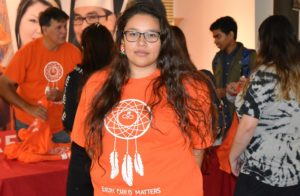‘Their stories must be repeated’ says Residential School Survivor

By Kelly Anne Smith
NORTH BAY—Shawnesia Ottawa sees Orange Shirt Day as an opportunity to bring awareness to mainstream society.
“My grandmother is a Residential School Survivor. All of her siblings were too. It’s a really big deal for me because of all the horror stories I’ve heard from them.”
23-year-old Ottawa is a student from Kitigan Zibi Anishinabeg First Nation attending the Indigenous Wellness and Addictions Prevention Program at Canadore College. She is also a member of the Canadore Aboriginal Student Association who volunteers her time on Orange Shirt Day.
“For me, it’s personal. My grandmother is a Residential School Survivor. All of her siblings were too. It’s a really big deal for me because of all the horror stories I’ve heard from them. I want to bring awareness to mainstream Canadian society,” explained Ottawa. “The Residential Schools weren’t talked about in mainstream society for a long time. These schools went on for over a hundred years. The last residential school was closed in 1996 but not everyone knows that. I was a baby. I was alive.”
Ottawa says she is happy to see students lining up to get their own Orange Shirt Day T-shirts.
“On the shirts themselves, it has a brief description saying the shirts are for the Residential School Children. The ones that didn’t make it out of there,” noted Ottawa. “My Grandmother was fortunate enough to be a survivor. From my community, the majority of them would go to Spanish. There was a Spanish Boys’ School and the Spanish Girls’ School.”
Shawnesia talked of the father of a close friend of hers that went to Mistassini Hostels in Quebec.
“He told me a little bit and I was just shocked. It’s wicked. Even though my grandmother and my friends father went, they have very similar stories of abuse. It’s hard. They were kids. My grandmother was six-years-old when she went.”
Shawnesia paused then continued in a stern voice.
“The children are our future. A child is innocent. Why would you do that to them? That’s what I really don’t understand.”
Once a child forced to attend Residential School herself, Theresa Hall was at Canadore College to share her story. She also asked those listening to commit to helping to record the stories of survivors in a quest that the dark history never be forgotten.
“My real name is Theresa Okima Hall originally from Attawapiskat First Nation. I’m a survivor of a Residential School so it’s important for me that each generation is aware of what has happened to us in the Residential School and that history does not repeat itself,” Hall stated. “I’m especially concerned since the Supreme Court of Canada decided to destroy the Residential School survivors’ evidence that they told about their stories, their abuses, their sexual abuses, their physical abuses, their emotional abuses and their spiritual abuses.”
“I want to be that voice, until I die. Their stories must be repeated. I’d also like to venture on writing those stories again,” expressed Hall. “I’m determined. I’m not going to be shut-up, not in the way government wants.”


